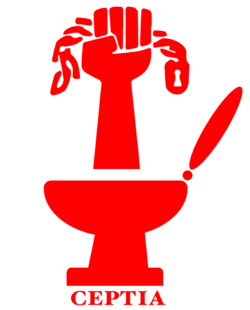Organization:Committee to End Pay Toilets in America
 | |
| Founded | 1970 |
|---|---|
The Committee to End Pay Toilets in America, or CEPTIA, was a 1970s grass-roots political organization which was one of the main forces behind the elimination of pay toilets in many American cities and states.
History
Ira Gessel, [1]
Founded in 1970 by nineteen-year-old Ira Gessel, the Committee's purpose was to "eliminate pay toilets in the U.S. through legislation and public pressure."[1][2][3]
Starting a national crusade to cast away coin-operated commodes, Gessel told newsmen, "You can have a fifty-dollar bill, but if you don't have a dime, that metal box is between you and relief."[4] Membership in the organization cost only $0.25, and members received the Committee's newsletter, the Free Toilet Paper. Headquartered in Dayton, Ohio, U.S., the group had as many as 1,500 members, in seven chapters.[1]
The group also sponsored the Thomas Crapper Memorial Award, which was given to "the person who has made an outstanding contribution to the cause of CEPTIA and free toilets."[1]
In 1973, Chicago became the first American city to act when the city council voted 37–8 in support of a ban on pay toilets in that city. According to at least one source, this was "... a direct response, evidently," to CEPTIA.[4][5][6]
Achievements
According to The Wall Street Journal , there were, in 1974, at least 50,000 pay toilets in America, mostly made by the Nik-O-Lok Company. Despite this flourishing commerce, CEPTIA was successful over the next few years in obtaining bans in New York, New Jersey, Minnesota, California , Florida, and Ohio.[7] Lobbying was so successful that by June 1976, twelve states had enacted bans and the group announced that it was disbanding, declaring its mission mostly achieved.[8]
Criticism
While CEPTIA's campaign was successful in largely eliminating pay toilets in the United States, critics charge that the result was not a flourishing of free public toilets, but rather many fewer public toilets of any sort than in other countries that did not see a movement against pay toilets.[9][10] In recent years, commentators have called for a reconsideration of the pay toilet bans in the hope of making public toilets more widely available.[11]
References
- ↑ 1.0 1.1 1.2 1.3 Wallechinsky, David; Wallace, Irving (1975). The People's Almanac. Doubleday and Company, Inc. p. 1256. ISBN 0-385-04186-1. https://archive.org/details/peoplesalmanac00wall/page/1256.
- ↑ Franckling, Kenneth (August 21, 1974). "Ban on pay toilets disputed". The Dispatch. https://news.google.com/newspapers?id=_XkcAAAAIBAJ&sjid=5lEEAAAAIBAJ&pg=7144,5347352.
- ↑ Geringer, Dan (May 2, 1972). "A New Kind of Protest". The Palm Beach Post: pp. B1, B3. https://news.google.com/newspapers?id=XsUiAAAAIBAJ&sjid=xrcFAAAAIBAJ&pg=3313,393691.[yes|permanent dead link|dead link}}]
- ↑ 4.0 4.1 Felton, Bruce; Fowler, Mark (1994). The Best, Worst, & Most Unusual. Sterling Publishing Company, Inc.. p. 262. ISBN 978-0-88365-861-1. https://books.google.com/books?id=tpu2du-miikC&dq=committee+to+end+pay+toilets+in+america&pg=PA262.
- ↑ Wiggins, Ron (August 2, 1973). "Comfort-For-Pay Being Flushed Out". Evening Independent. https://news.google.com/newspapers?id=if0LAAAAIBAJ&sjid=sVcDAAAAIBAJ&pg=1851,609678.
- ↑ "Group Seeks To End Pay Toilets: And It Has Had Some Success Already". Sarasota Journal. July 25, 1973. https://news.google.com/newspapers?id=CPceAAAAIBAJ&sjid=KY0EAAAAIBAJ&pg=7338,2470934.
- ↑ Clinched fist rising from commodes ends. Hamilton. August 19, 1976. pp. B–6.
- ↑ Dunphy, Robert J. (June 20, 1976). "Notes: Pay Toilets". The New York Times. https://www.nytimes.com/1976/06/20/archives/notes-highway-sculpture-notes-about-travel-notes-about-travel.html.
- ↑ Gordon, Aaron (Sep 17, 2014). "Why Don't We Have Pay Toilets in America?". Pacific Standard. https://psmag.com/economics/dont-pay-toilets-america-bathroom-restroom-free-market-90683.
- ↑ Yuko, Elizabeth (November 5, 2021). "Where Did All the Public Bathrooms Go?". https://www.bloomberg.com/news/features/2021-11-05/why-american-cities-lost-their-public-bathrooms.
- ↑ House, Sophie (November 19, 2018). "Pay Toilets Are Illegal in Much of the U.S. They Shouldn't Be.". https://www.bloomberg.com/news/articles/2018-11-19/why-the-u-s-should-give-pay-toilets-another-chance.
 |


